Aerospace Engineer Average Salary in Japan 2024
How much money does a person working as Aerospace Engineer make in Japan?

LOW
361,000
JPY AVERAGE
669,000
JPY HIGH
1,010,000
JPY
A person working as Aerospace Engineer in Japan typically earns around 669,000 JPY. Salaries range from 361,000 JPY (lowest) to 1,010,000 JPY (highest).
Salary Variance
This is the average salary including housing, transport, and other benefits. Aerospace Engineer salaries in Japan vary drastically based on experience, skills, gender, or location. Below you will find a detailed breakdown based on many different criteria.
Aerospace Engineer Pay Scale and Salaries in Japan
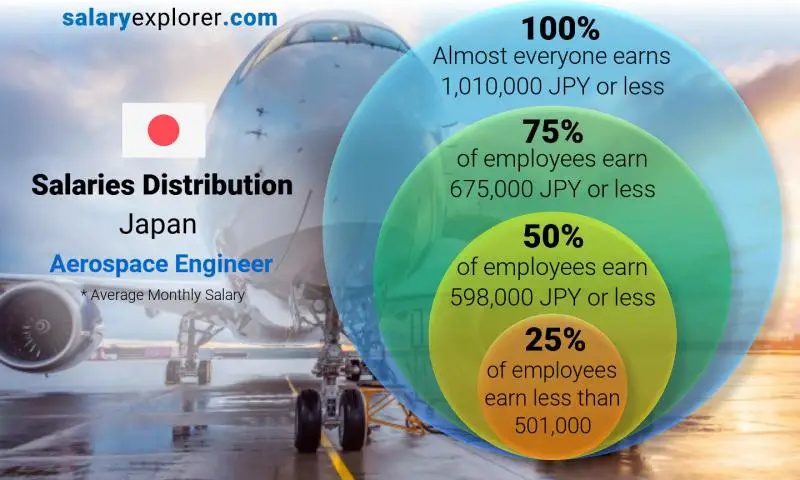
Salary Structure and Pay Scale Comparison
596,000 JPY or more
534,000 to 596,000 JPY
397,000 JPY or less
397,000 to 534,000 JPY
 361,000 JPY |
 598,000 JPY |
 1,010,000 JPY |
Median Salary, maximum and minimum salary, minimum wage, starting salary, and the salary range
Salary Range, Minimum Wage, and Starting Salary
Salaries for the position Aerospace Engineer in Japan range from 361,000 JPY (starting salary) to 1,010,000 JPY (maximum salary). It should be noted that the given figure is not the legally mandated minimum wage; rather, it represents the lowest figure reported in a salary survey that included thousands of participants and professionals from all regions of the country.
Median Salary
With a median salary of 598,000 JPY, half of the professionals who work as Aerospace Engineer in Japan earn less than this amount, and the other half earn more. The median salary denotes the middle value of salaries. Ideally, you would want to belong to the group earning more than the median salary, located on the right side of the salary distribution graph.
Percentiles and Salary Scale
The median is closely associated with two other values known as the 25th and 75th percentiles. By examining the salary distribution chart, it can be determined that 25% of professionals employed as Aerospace Engineer in Japan earn less than 501,000 JPY, while 75% earn more. Similarly, the chart shows that 75% earn less than 675,000 JPY while 25% earn more.
Pay Scale Structure
To provide a better understanding of expected salaries, we categorized the frequently occurring salaries into different ranges. This approach provides a more precise representation of salary distribution for the job title Aerospace Engineer in Japan compared to simply calculating the average. The majority of reported salaries, approximately 65%, fall within the range of 397,000 JPY to 534,000 JPY. About 20% of salaries are below the 397,000 JPY mark, while 10% fall within the range of 534,000 JPY to 596,000 JPY. Only 5% of individuals have salaries exceeding 596,000 JPY.
Salary Comparison by Years of Experience / Aerospace Engineer / Japan
How do experience and age affect pay?
| 0 - 2 Years | 420,000 JPY | |
| 2 - 5 Years | +26% | 530,000 JPY |
| 5 - 10 Years | +32% | 699,000 JPY |
| 10 - 15 Years | +18% | 822,000 JPY |
| 15 - 20 Years | +11% | 910,000 JPY |
| 20+ Years | +6% | 968,000 JPY |
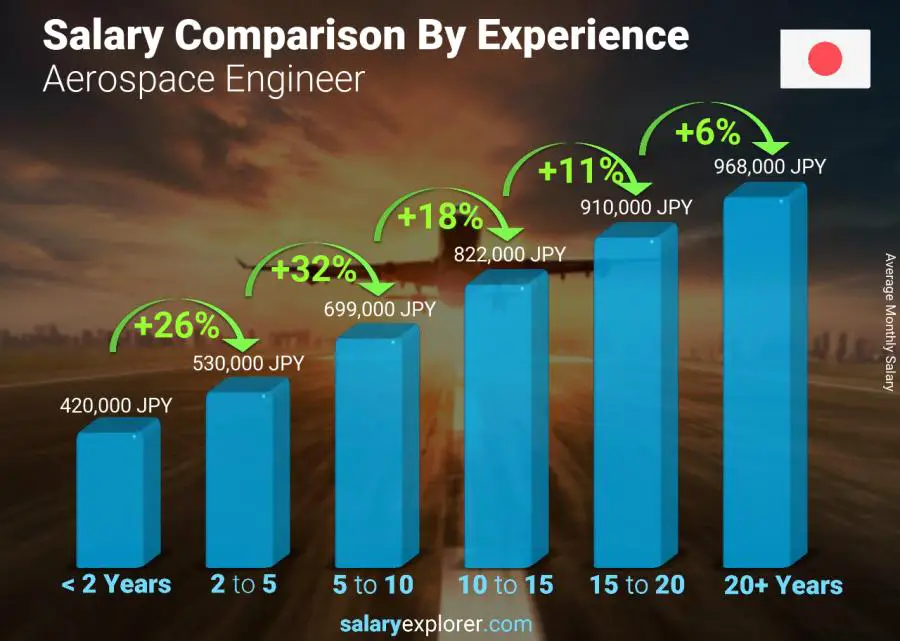
The experience level is the most important factor in determining the salary. Naturally, the more years of experience the higher the wage. We broke down salaries by experience level for people working as Aerospace Engineer and this is what we found.
Employees with less than two years of experience earn approximately 420,000 JPY.
While someone with an experience level between two and five years is expected to earn 530,000 JPY, 26% more than someone with less than two year's experience.
Moving forward, an experience level between five and ten years lands a salary of 699,000 JPY, 32% more than someone with two to five years of experience.
Additionally, professionals whose expertise span anywhere between ten and fifteen years get a salary equivalent to 822,000 JPY, 18% more than someone with five to ten years of experience.
If the experience level is between fifteen and twenty years, then the expected wage is 910,000 JPY, 11% more than someone with ten to fifteen years of experience.
Lastly, employees with more than twenty years of professional experience get a salary of 968,000 JPY, 6% more than people with fifteen to twenty years of experience.
Typical Salary Progress for Most Careers
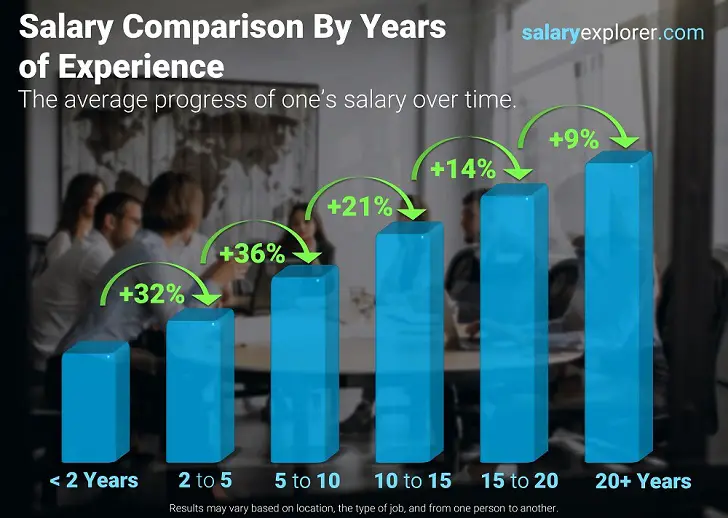
Salary Comparison By Education / Aerospace Engineer / Japan
How do education levels affect salaries?
Displayed below is the average salary variance between different education levels of professionals working as Aerospace Engineer.
| Bachelor's Degree | 543,000 JPY | |
| Master's Degree | +53% | 829,000 JPY |
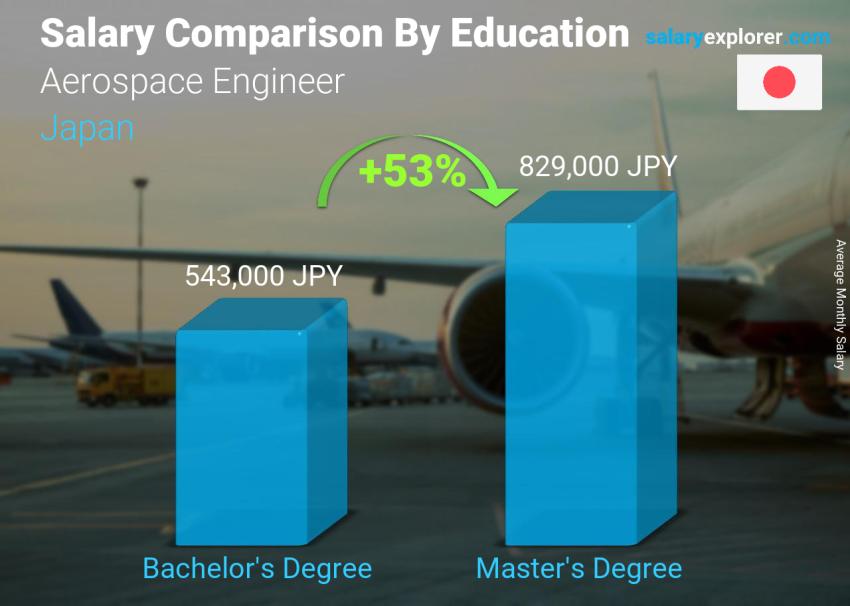
We all know that higher education equals a bigger salary, but how much more money can a degree add to your income? We broke down salaries by education level for the position Aerospace Engineer in order to make a comparison.
Level 1: Bachelor's Degree
Employees at this education level have an average salary of 543,000 JPY.
Level 2: Master's Degree
At this level, the average salary becomes 829,000 JPY, 53% more than the previous level.
Is a Master's degree or an MBA worth it? Should you pursue higher education?
A Master's degree program or any post-graduate program in Japan costs anywhere from 2,580,000 JPY to 7,750,000 JPY and lasts approximately two years. That is quite an investment.
You can't really expect any salary increases during the study period, assuming you already have a job. In most cases, a salary review is conducted once education is completed and the degree has been attained.
Many people pursue higher education as a tactic to switch to a higher-paying job. The numbers seem to support the theory. The average increase in compensation while changing jobs is approximately 10% more than the customary salary increment.
If you can afford the costs of higher education, the return on investment is definitely worth it. You should be able to recover the costs in roughly a year or so.
Typical Salary Difference by Education for Most Careers
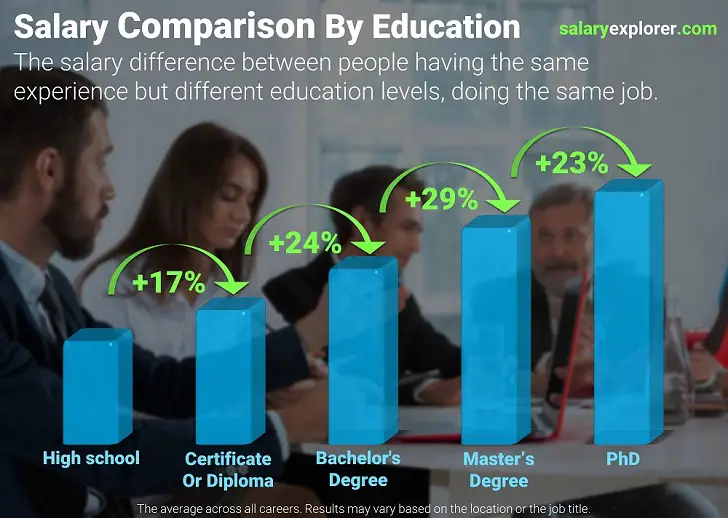
Salary and Compensation Comparison By Gender / Aerospace Engineer / Japan
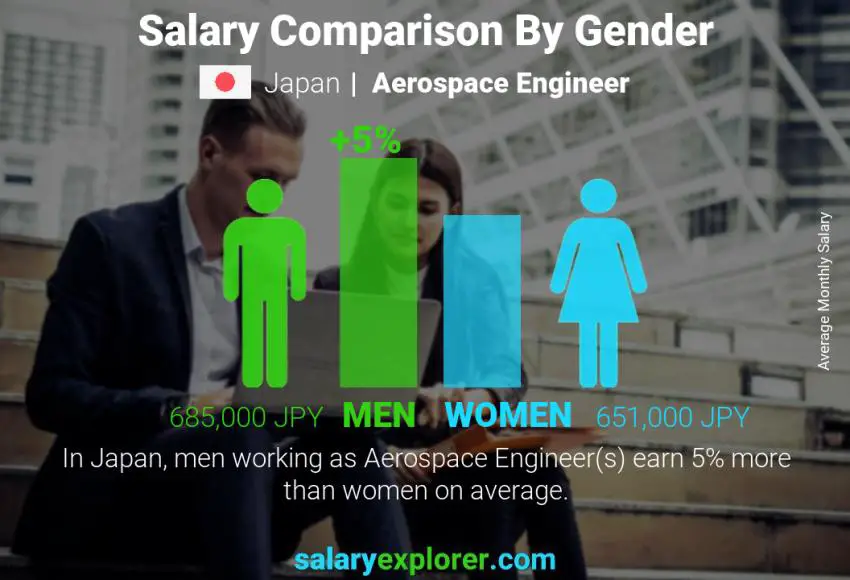
Though gender should not have an effect on pay, in reality, it does. So who gets paid more: men or women? For the people who work as Aerospace Engineer in Japan, the average difference between the salary of male and female employees is 5%.
| Male | 685,000 JPY | |
| Female | -5% | 651,000 JPY |
Salary Comparison By Gender in Japan for all Careers
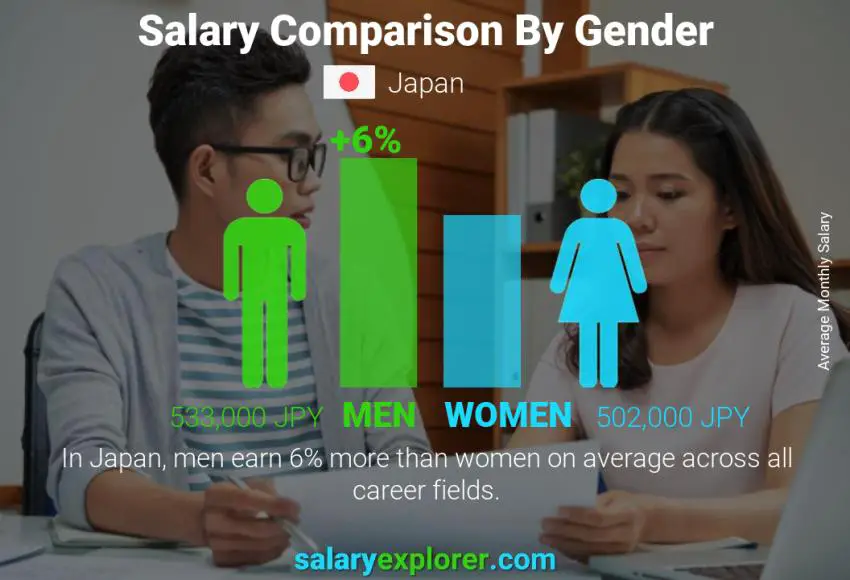
Average Annual Salary Increment Percentage / Aerospace Engineer / Japan
How much are annual salary increments in Japan for individuals working as Aerospace Engineer? How often do employees get salary raises?
Individuals working as Aerospace Engineer in Japan are likely to observe a salary increase of approximately 12% every 16 months. The national average annual increment for all professions combined is 8% granted to employees every 16 months.
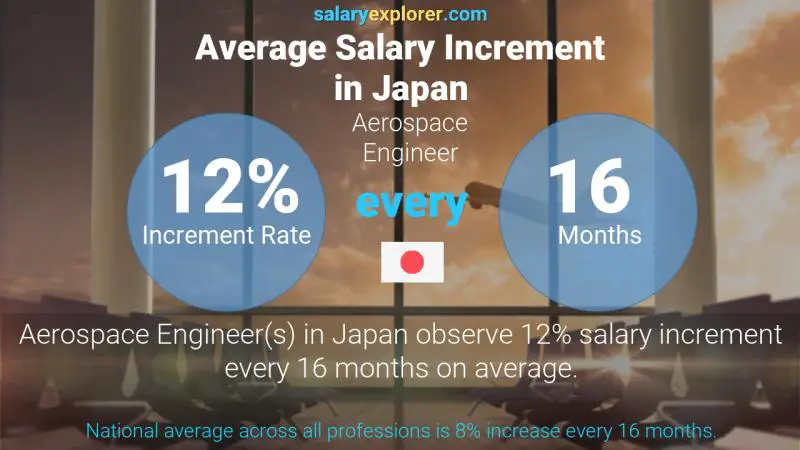
Japan / All Professions
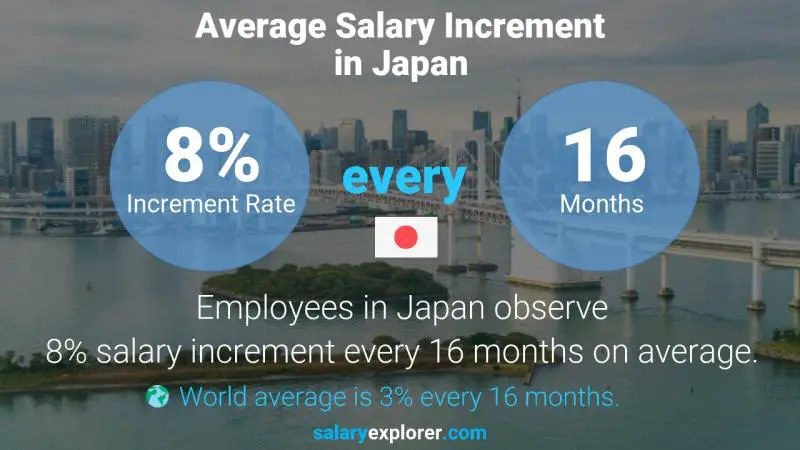
The term Annual Salary Increase usually refers to the increase in 12 calendar month period, but because it is rare that people get their salaries reviewed exactly on the one-year mark, it is more meaningful to know the frequency and the rate at the time of the increase.
How to calculate the salary increment percentage?
The annual salary Increase in a calendar year (12 months) can be easily calculated as follows: Annual Salary Increase = Increase Rate x 12 / Increase Frequency
Worldwide Salary Raises: All Countries and All Jobs
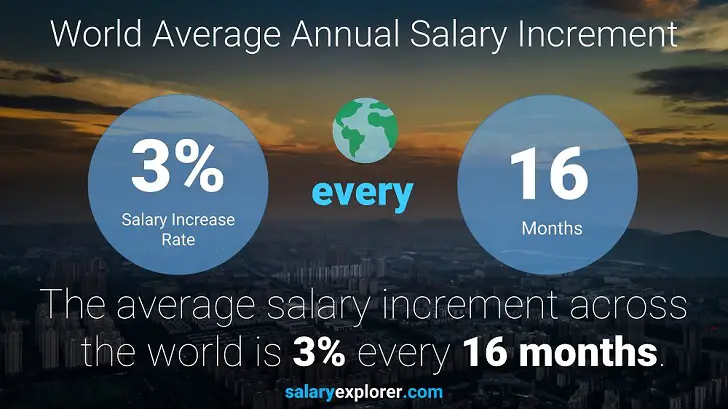
Salary Packages and Schemes
Not all compensation increases are reflected directly in the salary. Some companies offer upgraded packages to their staff instead of cash money. The figures displayed here account only for direct increments to the base salary.
Bonus and Incentive Rates / Aerospace Engineer / Japan
How much and how often are bonuses being awarded?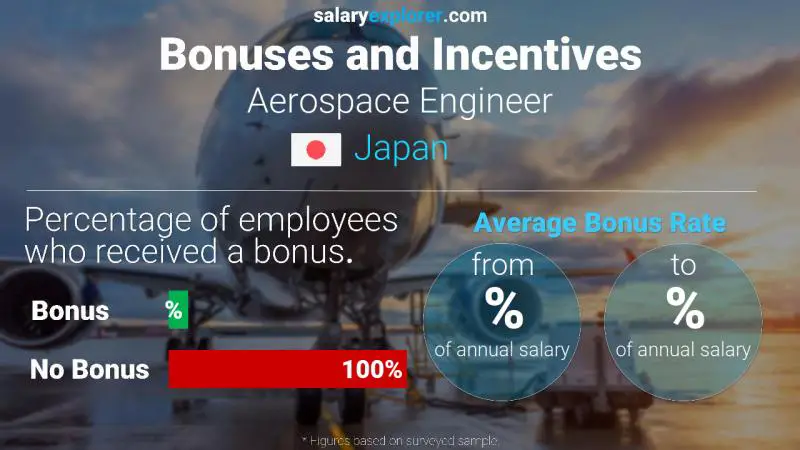 Share This Chart Tweet Get Chart Linkhttp://www.salaryexplorer.com/charts/japan/airlines-aviation-aerospace-defense/aerospace-engineer/annual-salary-bonus-rate-japan-aerospace-engineer.jpg
Share This Chart Tweet Get Chart Linkhttp://www.salaryexplorer.com/charts/japan/airlines-aviation-aerospace-defense/aerospace-engineer/annual-salary-bonus-rate-japan-aerospace-engineer.jpg
46% of surveyed staff reported that they haven't received any bonuses or incentives in the previous year while 54% said that they received at least one form of monetary bonus.
Those who got bonuses reported rates ranging from 4% to 5% of their annual salary.
| Received Bonus | 54% | |
| No Bonus | 46% |
Types of Bonuses Considered
Individual Performance-Based BonusesThe most standard form of bonus, where the employee is awarded based on their exceptional performance.
Company Performance BonusesOccasionally, some companies like to celebrate excess earnings and profits with their staff collectively in the form of bonuses that are granted to everyone. The amount of the bonus will probably be different from person to person depending on their role within the organization.
Goal-Based BonusesGranted upon achieving an important goal or milestone.
Holiday / End of Year BonusesThese types of bonuses are given without a reason and usually resemble an appreciation token.
Bonuses Are Not Commissions!
People tend to confuse bonuses with commissions. A commission is a prefixed rate at which someone gets paid for items sold or deals completed while a bonus is in most cases arbitrary and unplanned.
What makes a position worthy of good bonuses and a high salary?
The main two types of jobs | |
| Revenue Generators | Supporting Cast |
Employees that are directly involved in generating revenue or profit for the organization. Their field of expertise usually matches the type of business. | Employees that support and facilitate the work of revenue generators. Their expertise is usually different from that of the core business operations. |
Example: | Example: |
Revenue generators usually get more and higher bonuses, higher salaries, and more frequent salary increments. The reason is quite simple: it is easier to quantify your value to the company in monetary terms when you participate in revenue generation.
Bonus Comparison by Seniority Level
Top management personnel and senior employees naturally exhibit higher bonus rates and frequencies than juniors. This is very predictable due to the inherent responsibilities of being higher in the hierarchy. People in top positions can easily get double or triple bonus rates than employees down the pyramid.
Average Hourly Wage / Aerospace Engineer / Japan
 3,860 JPY per hour
3,860 JPY per hourThe average hourly wage (pay per hour) for individuals working as Aerospace Engineer in Japan is 3,860 JPY.This is the rate they get paid for every worked hour.
About The Hourly Pay Rate
The hourly wage is the salary paid in one worked hour. Usually, jobs are classified into two categories: salaried jobs and hourly jobs. Salaried jobs pay a fixed amount regardless of the hours worked. Hourly jobs pay per worked hour. To convert salary into hourly wage the above formula is used (assuming 5 working days in a week and 8 working hours per day which is the standard for most jobs). The hourly wage calculation may differ slightly depending on the worked hours per week and the annual vacation allowance. The figures mentioned above are good approximations and are considered to be the standard. One major difference between salaried employees and hourly paid employees is overtime eligibility. Salaried employees are usually exempt from overtime as opposed to hourly paid staff.
What is the minimum hourly rate of pay?
The minimum pay rate per hour for people working as Aerospace Engineer in Japan is 2,080 JPY. This is the minimum as per the gathered data in the salary survey not the minimum hourly rate mandated by law.
Salary comparison with similar jobs
| Job Title | Average Salary |
| Airlines / Aviation / Aerospace / Defense |  -100% -100% | |
| Aeronautical Engineer | 590,000 JPY |  -12% -12% |
| Aerospace Engineer | 669,000 JPY |  -0% -0% |
| Aerospace Technician | 535,000 JPY |  -20% -20% |
| Air Crew Member | 343,000 JPY |  -49% -49% |
| Air Crew Officer | 370,000 JPY |  -45% -45% |
| Air Traffic Assistant | 325,000 JPY |  -51% -51% |
| Air Traffic Controller | 579,000 JPY |  -13% -13% |
| Air Traffic Management Automation Engineer | 592,000 JPY |  -12% -12% |
| Aircraft 3D Printing Technician | 492,000 JPY |  -26% -26% |
| Aircraft Assembler | 294,000 JPY |  -56% -56% |
| Aircraft Body Repairer | 237,000 JPY |  -65% -65% |
| Aircraft Cabin Interior Designer | 580,000 JPY |  -13% -13% |
| Aircraft Captain | 847,000 JPY |  +27% +27% |
| Aircraft Cybersecurity Specialist | 651,000 JPY |  -3% -3% |
| Aircraft Electrician | 295,000 JPY |  -56% -56% |
| Aircraft Electronics Techician | 287,000 JPY |  -57% -57% |
| Aircraft Engineer | 541,000 JPY |  -19% -19% |
| Aircraft Fueler | 249,000 JPY |  -63% -63% |
| Aircraft Maintenance Engineer | 506,000 JPY |  -24% -24% |
| Aircraft Maintenance Manager | 874,000 JPY |  +31% +31% |
| Aircraft Maintenance Supervisor | 577,000 JPY |  -14% -14% |
| Aircraft Maintenance Technician | 257,000 JPY |  -62% -62% |
| Aircraft Mechanic | 287,000 JPY |  -57% -57% |
| Aircraft Pilot | 905,000 JPY |  +35% +35% |
| Aircraft Pneudraulics Repairer | 270,000 JPY |  -60% -60% |
| Aircraft Quality Assurance | 735,000 JPY |  +10% +10% |
| Aircraft Rigging Assembler | 273,000 JPY |  -59% -59% |
| Aircraft Service Technician | 259,000 JPY |  -61% -61% |
| Airfield Management Specialist | 840,000 JPY |  +26% +26% |
| Airfield Operations Specialist | 636,000 JPY |  -5% -5% |
| Airline Augmented Reality Developer | 492,000 JPY |  -26% -26% |
| Airline Cabin Crew | 559,000 JPY |  -16% -16% |
| Airline Copilot | 620,000 JPY |  -7% -7% |
| Airline Customer Experience Designer | 585,000 JPY |  -13% -13% |
| Airline Data Analyst | 559,000 JPY |  -16% -16% |
| Airline Pilot | 957,000 JPY |  +43% +43% |
| Airlines Sales Director | 1,050,000 JPY |  +57% +57% |
| Airlines Sales Manager | 966,000 JPY |  +44% +44% |
| Airlines Structural Assembler | 249,000 JPY |  -63% -63% |
| Airport Services Agent | 346,000 JPY |  -48% -48% |
| Airport Services Manager | 1,050,000 JPY |  +57% +57% |
| Airport Services Supervisor | 627,000 JPY |  -6% -6% |
| Airport Sustainability Manager | 736,000 JPY |  +10% +10% |
| Assistant Aircraft Mechanic | 248,000 JPY |  -63% -63% |
| Autonomous Air Taxi Coordinator | 338,000 JPY |  -49% -49% |
| Aviation Analyst | 749,000 JPY |  +12% +12% |
| Aviation Biofuel Specialist | 585,000 JPY |  -13% -13% |
| Aviation Engineer | 575,000 JPY |  -14% -14% |
| Aviation Inspector | 613,000 JPY |  -8% -8% |
| Aviation Manager | 1,170,000 JPY |  +75% +75% |
| Aviation Operations Controller | 607,000 JPY |  -9% -9% |
| Aviation Resources Manager | 950,000 JPY |  +42% +42% |
| Aviation Safety Assistant | 319,000 JPY |  -52% -52% |
| Aviation Safety Manager | 1,040,000 JPY |  +55% +55% |
| Aviation Safety Officer | 563,000 JPY |  -16% -16% |
| Aviation Security Specialist | 682,000 JPY |  +2% +2% |
| Aviation Sustainability Consultant | 762,000 JPY |  +14% +14% |
| Aviation Technician | 244,000 JPY |  -64% -64% |
| Aviation Training Specialist | 601,000 JPY |  -10% -10% |
| Cargo and Freight Agent | 243,000 JPY |  -64% -64% |
| Cargo Executive | 498,000 JPY |  -26% -26% |
| Chief Pilot | 929,000 JPY |  +39% +39% |
| Drone Compliance Officer | 540,000 JPY |  -19% -19% |
| Drone Delivery Specialist | 484,000 JPY |  -28% -28% |
| Drone Emergency Response Coordinator | 450,000 JPY |  -33% -33% |
| Drone Engineer | 490,000 JPY |  -27% -27% |
| Drone Event Coordinator | 458,000 JPY |  -32% -32% |
| Drone Fleet Manager | 594,000 JPY |  -11% -11% |
| Drone Geospatial Analyst | 554,000 JPY |  -17% -17% |
| Drone Infrastructure Engineer | 588,000 JPY |  -12% -12% |
| Drone Inspection Specialist | 509,000 JPY |  -24% -24% |
| Drone Inspector | 500,000 JPY |  -25% -25% |
| Drone Insurance Underwriter | 431,000 JPY |  -36% -36% |
| Drone Light Show Choreographer | 434,000 JPY |  -35% -35% |
| Drone Operator / Pilot | 350,000 JPY |  -48% -48% |
| Drone Payload Specialist | 397,000 JPY |  -41% -41% |
| Drone Pilot Instructor | 440,000 JPY |  -34% -34% |
| Drone Security Specialist | 503,000 JPY |  -25% -25% |
| Drone Software Engineer | 473,000 JPY |  -29% -29% |
| Drone Surveyor | 402,000 JPY |  -40% -40% |
| Drone Technician | 334,000 JPY |  -50% -50% |
| Drone Traffic Controller | 357,000 JPY |  -47% -47% |
| Drone Traffic Management Specialist | 527,000 JPY |  -21% -21% |
| Drone Traffic Safety Engineer | 507,000 JPY |  -24% -24% |
| Drone Videographer | 447,000 JPY |  -33% -33% |
| First Officer | 405,000 JPY |  -39% -39% |
| Fleet Controller | 899,000 JPY |  +34% +34% |
| Fleet Management Officer | 360,000 JPY |  -46% -46% |
| Flight Attendant | 359,000 JPY |  -46% -46% |
| Flight Planner | 473,000 JPY |  -29% -29% |
| Flight Scheduler | 440,000 JPY |  -34% -34% |
| Flight Simulation Engineer | 477,000 JPY |  -29% -29% |
| Freight and Cargo Inspector | 394,000 JPY |  -41% -41% |
| Helicopter Pilot | 593,000 JPY |  -11% -11% |
| Loading Bridge Operator | 228,000 JPY |  -66% -66% |
| Pilot | 929,000 JPY |  +39% +39% |
| Ramp Agent | 246,000 JPY |  -63% -63% |
| Reservations Sales Agent | 313,000 JPY |  -53% -53% |
| Safety and Quality Specialist | 540,000 JPY |  -19% -19% |
| Test Pilot | 686,000 JPY |  +3% +3% |
| Unmanned Aerial Vehicle Operator | 424,000 JPY |  -37% -37% |
| Unmanned Aircraft Systems Technician | 401,000 JPY |  -40% -40% |
| Virtual / Augmented Reality Flight Simulator Designer | 553,000 JPY |  -17% -17% |
Government vs Private Sector Salary Comparison
Where can you get paid more, working in a private company or the government? The difference between the public or government sector salaries and the private sector salaries in Japan is 4% on average across all career fields.
| Private Sector | 506,000 JPY | |
| Public Sector | +4% | 527,000 JPY |
Salary Statistics and Calculation Guide
What is considered to be a good and competitive salary for the job title Aerospace Engineer in Japan?
A good and competitive compensation would range anywhere between 598,000 JPY and 675,000 JPY. This is a very rough estimate. Experience and education play a very huge part in the final earnings.
Gross Salary (before tax) and Net Salary (after tax)
All salary and compensation figures displayed here are gross salary figures, that is the salary before tax deductions. Because taxes may differ across sectors and locations, it is difficult to accurately calculate the net salary after tax for every career.
Base / Basic Salary
The base salary for a careers like Aerospace Engineer in Japan ranges from 361,000 JPY to 501,000 JPY. The base salary depends on many factors including experience and education. It is not easy to provide a figure with very little information, so take this range with a grain of salt.
What is the difference between the median and the average salary?
Both are indicators. If your salary is higher than both the average and the median then you are doing very well. If your salary is lower than both, then many people earn more than you and there is plenty of room for improvement. If your wage is between the average and the median, then things can be a bit complicated. We wrote a guide to explain all about the different scenarios. How to compare your salary




